Some travelers book tickets to Indonesia (or Malaysia) during Ramadan and/or Eid unintentionally and worry that their trip will be negatively affected. We have personally spent multiple summers in Indonesia during Ramadan and Eid, specifically in Southeast Sulawesi, which has a Muslim majority.
Ramadan and Eid are actually a great time to experience the culture in Indonesia, and although there are some important tips to keep in mind in order to make sure you have an enjoyable trip, there is no need to cancel your plans to visit Indonesia during this holiday.
What is important to know before you travel to Indonesia during Ramadan?
Probably the biggest thing to be aware of for people traveling during Ramadan in Indonesia is that the flights and other transportation book up quickly and are much more expensive—at the end of the month of Ramadan, for the Eid holiday, and for the week following Eid.
This is because people from all over Indonesia (a country of over 265 million people and the fourth most populous country in the world) are traveling to visit their families.
This means that even places in Indonesia that are not majority-Muslim, such as Bali (which is majority-Hindu) and Raja Ampat (which is majority-Christian), can be very crowded due to domestic tourism from around Indonesia.
Hotels and other accommodation may also book up quickly at the end of Ramadan and Eid.
BOOK ACCOMMODATION EARLY (at least a couple of months in advance if possible) and get to where you want to be to celebrate the end of Ramadan and the Eid holiday a good week and a half to two weeks before Eid is expected to begin.
Then you can just chill and not deal with the expensive hassle of trying to get somewhere on time for Eid.
Transportation is expensive immediately after Eid as well so if you want to save money on airfare, give yourself another 5-10 days afterward before booking travel to your next location (if this is possible!).
Sites and attractions, such as temples, should still be open during Ramadan, but might be closed on Eid. If you’re hiring guides or porters for hikes or treks, ask them if they’re fasting before offering them food or cigarettes.
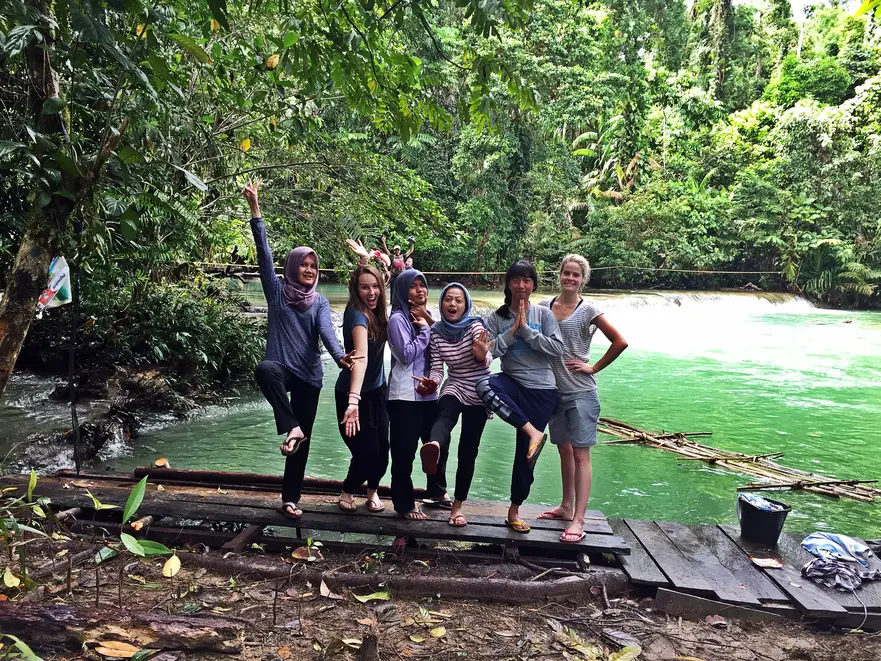
When is Ramadan in Indonesia in 2020?
In 2020, Ramadan is expected to start April 23 and finish May 23—ending with the celebration of Eid (also called Lebaran or Idul Fitri in Indonesia).
However, the dates of Ramadan are slightly different every year and may vary slightly (see section below about the Islamic calendar) and the start date of Ramadan has been hotly debated in Indonesia in the past.
Which parts of Indonesia have a Muslim majority?
These Indonesian islands have a Muslim majority population and will be more likely affected by the Ramadan and Eid holiday:
- Sumatra
- Java
- Kalimantan (coastal areas)
- Sulawesi
- Lombok
- Sumbawa
- North Moluccas
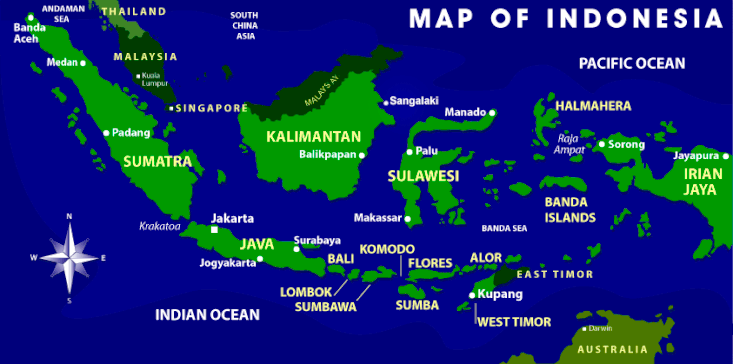
What is allowed and not allowed during Ramadan in Indonesia? Do you have to fast?
Tourists in Indonesia can experience Ramadan without having to adhere to the strict no-eating-or-drinking custom that applies by law in some other Muslim-majority countries.
It seems that in Bali, you won’t be affected at all by the holiday culturally, as Bali is mainly Hindu. The same goes for Raja Ampat, which has a Christian majority and does not observe Ramadan for the most part.
In Southeast Sulawesi, where we spent several Ramadan holidays between us over the years, we were able to observe our Indonesian friends (from various parts of Indonesia) practicing customs such as fasting and praying but we were not at all expected to participate in these customs, as tourists and non-Muslims.
In the ecology work we were doing in Sulawesi, we were sometimes walking 6+ hours in the hot, humid Indonesian rainforest ankle-deep in mud—and the Indonesian scientists and guides with us wouldn’t even have a sip of water, but we as foreigners were not expected to do the same.
This is an extreme situation of course! I just bring it up to show the dedication and seriousness of the custom of fasting.
In other, more “normal” situations, such as when we were in the village or in a larger town during Ramadan, we tried to be mindful that people around us were fasting all day. So, we didn’t eat or drink walking down the street.
It’s really easy for travelers in Indonesia to forget that it’s Ramadan, because not much seems different. It’s quieter but it may not be overly apparent to outsiders that a holy and special occasion is underway.
In many towns and cities, you’ll also see that the restaurants and cafes put up curtains to hide the people (usually tourists) who are eating and drinking.
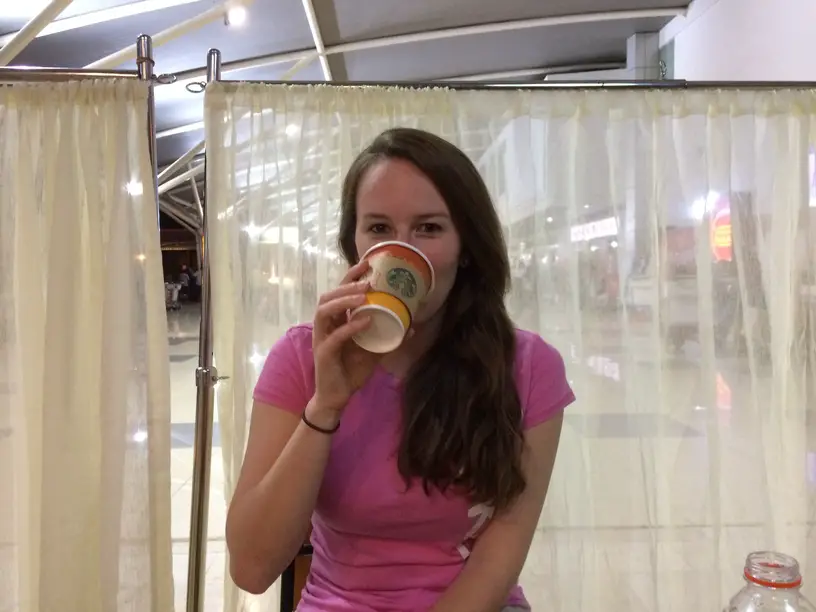
Brittany at Starbucks in an Indonesian airport during Ramadan, blocked off by curtains
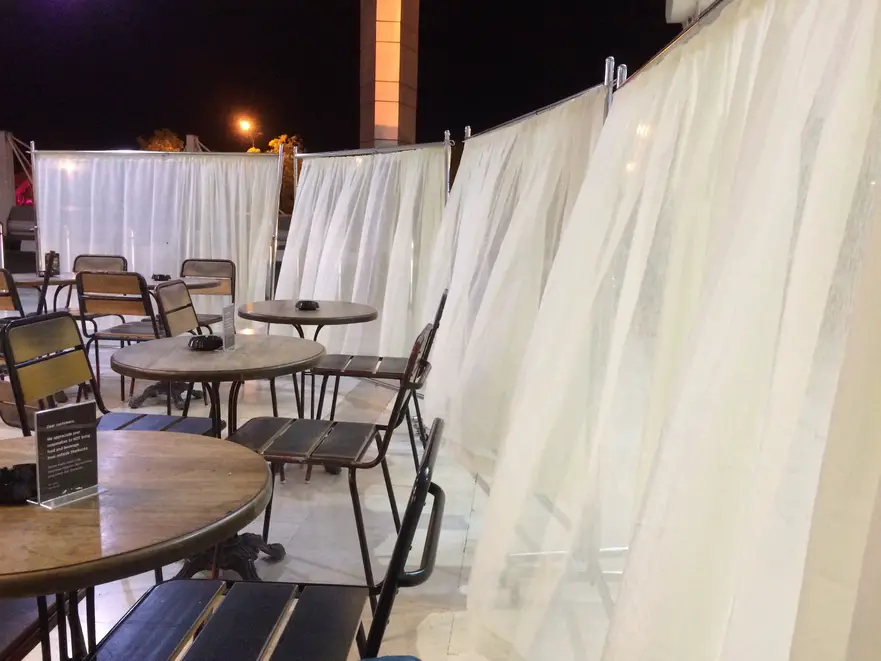
Curtains surround restaurants and cafes during Ramadan in Indonesia
Bottom line—you’re not expected to fast as a tourist, but maybe don’t shove food in your face in public places if you can avoid it!
Alcohol in Indonesia during Ramadan and Eid
Alcohol isn’t illegal in Indonesia, but as a Muslim-majority country, it seems to be frowned upon and difficult to buy—especially in small rural parts of Indonesia. Travelers should probably be aware of this and also that there have been cases of people dying from bootleg, home-brewed alcohol.
It’s probably best just to skip the alcohol during your visit if possible, especially during Ramadan if you’re trying to be respectful.
What to wear and what NOT to wear in Indonesia during Ramadan and Eid
On Eid in Indonesia, the traditional clothes people wear will vary from island to island, and even from community to community.
Even on the tiny island of Buton in Southeast Sulawesi, there are many different cultures and languages—and many different traditional ways of dressing for Eid.
In general in Indonesia, during Ramadan or not, it’s important to dress conservatively while traveling in Muslim-majority areas (not Bali or Raja Ampat). This means for men and women: wear long pants (not shorts or skirts), T-shirts are okay, open-toed shoes/sandals are okay, and cleavage is a definite no-no. It’s hot in Indonesia, but if you want to be respectful, follow these rules. Just buy some light-weight, loose pants or long skirts 🙂
We were encouraged on Eid to wear the traditional sarongs of Labundo, the village where we were living. Both men and women wear sarongs, but with different patterns from each other. Sarongs are so comfortable and perfect for the jungle weather.
Head scarves—Do women travelers have to wear hijabs in Indonesia?
Many Muslim women in Indonesia choose to cover their heads and many women also choose not to—travelers and tourists to Indonesia are not expected to wear headscarves.
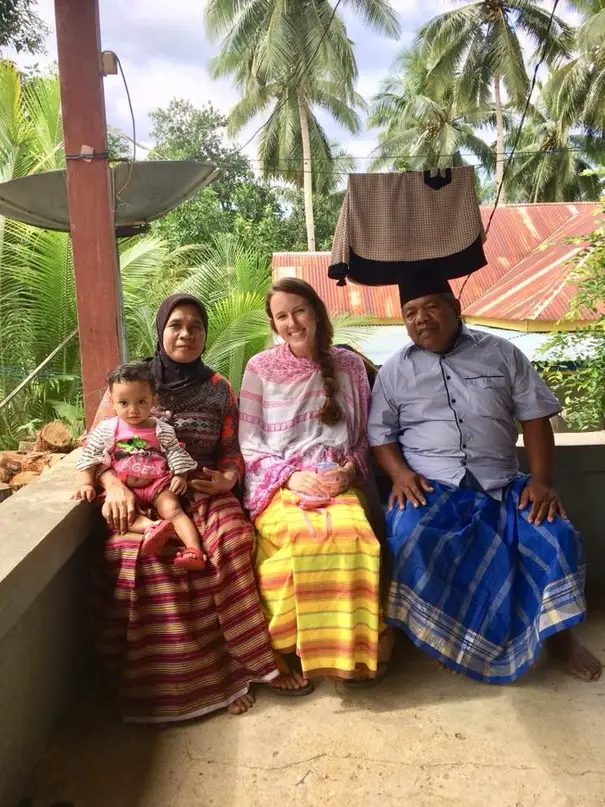
Brittany and her amazing host family on Idul Fitri
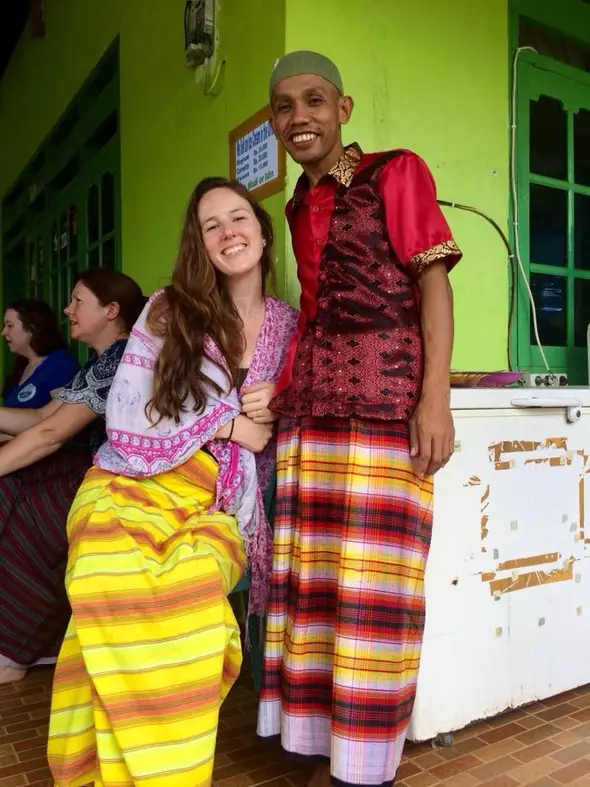
Brittany and Fifin, celebrating Idul Fitri in Labundo, Southeast Sulawesi, Indonesia
The Food in Indonesia during Ramadan and Eid
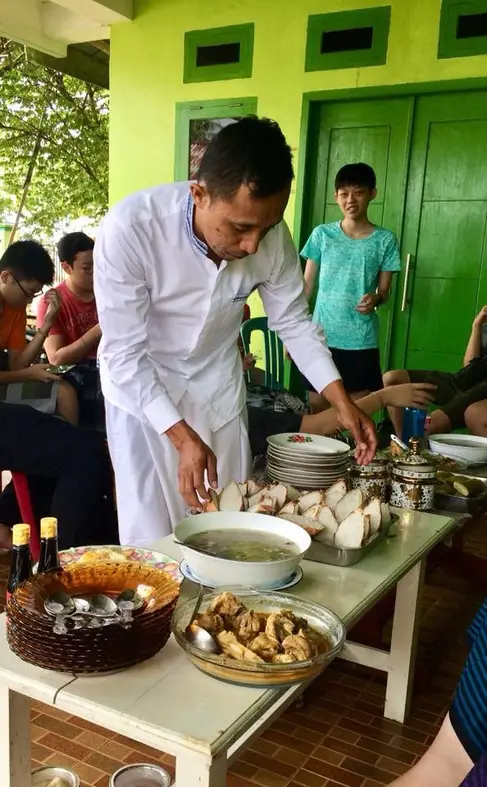
When we were working in Southeast Sulawesi (specifically on the island of Buton), we were being hosted by a family. We lived in a tiny village of an estimated 200 people.
During Eid (or Idul Fitri), we were welcomed into not only our host family’s home, but into about ten others for a meal. Based on stories from Indonesian friends and other travelers, this is a common occurrence. Indonesian are so friendly, welcoming, and generous and we were so privileged to be invited into so many homes for dinner!
Also, the food is delicious. There are a lot of little sweet desserts, rice-based snacks wrapped in banana leaves, and lots of meat.
In larger towns and cities, you’ll find busy night street markets selling all kinds of food special to Ramadan and Eid. The biggest city on Buton Island, where we were, is called Bau Bau, which has a night street market (not only during Ramadan) that sells everything from street food to fidget spinners.
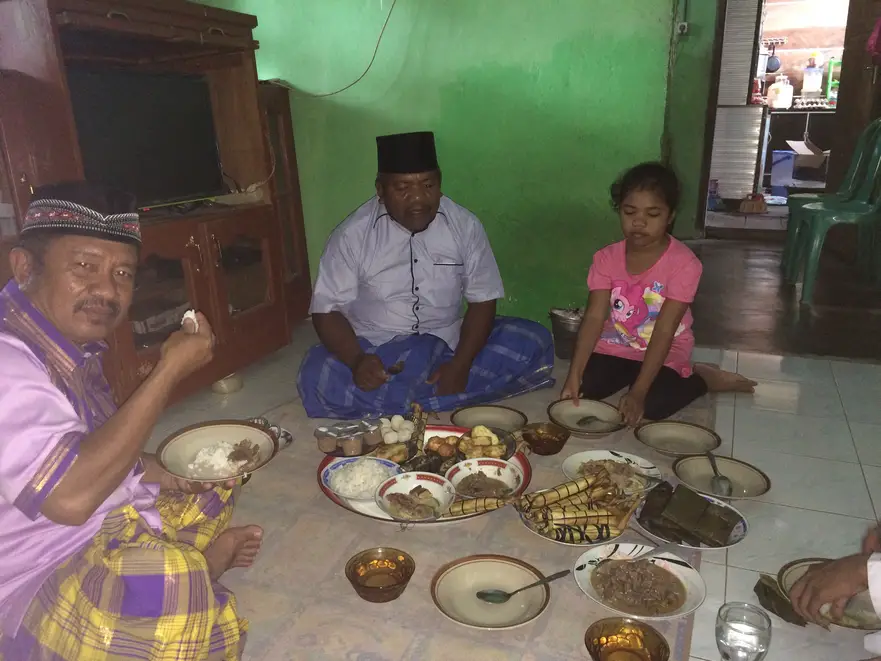
Eid meal with our host family in Labundo, Southeast Sulawesi, Indonesia
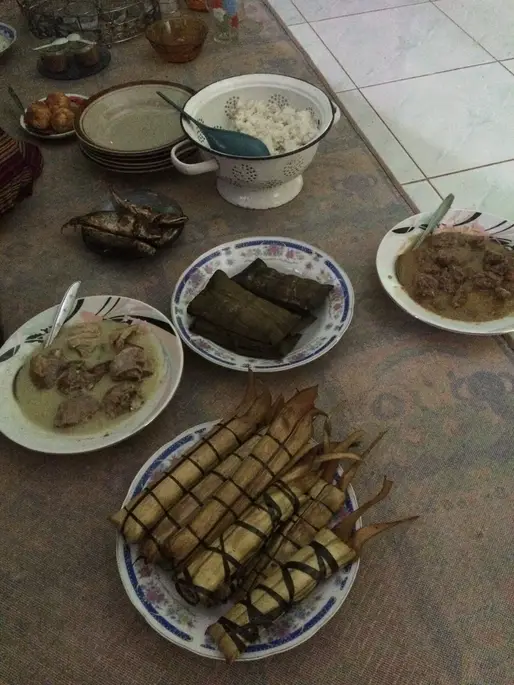
Plates and plates of food…
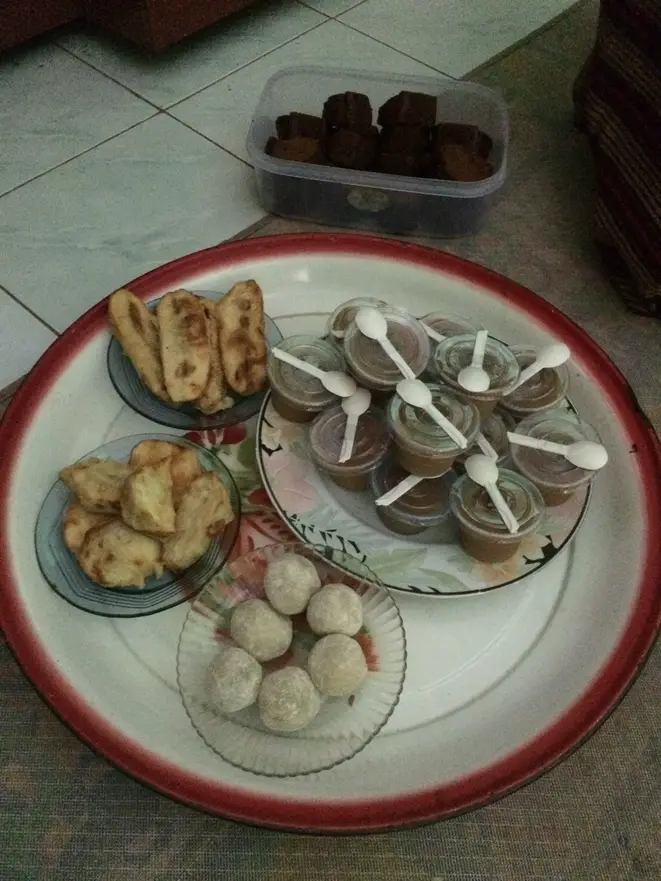
LOTS of sweet stuff
The Celebrations in Indonesia during Ramadan and Eid
During the month of Ramadan, the days will probably be quiet and slow as people are fasting and usually not expending a lot of energy. Nights are lively as people go to prayer at the mosques and the street markets fill with people.
On Buton Island in the small villages, the sounds of the mosques are very loud and you can expect to wake up to them early every morning! No alarm needed. This in addition to the sounds of the roosters and chickens 🙂
On Eid on Buton, everyone, especially kids, light and throw loud firecrackers in the streets. At night, truckloads of people carrying candles, singing, and playing music, drive by on the island’s main road, in a huge processional parade.
In Indonesia on Eid, expect lots of family time, food, prayers, and celebration.
What should you say on Eid in Indonesia?
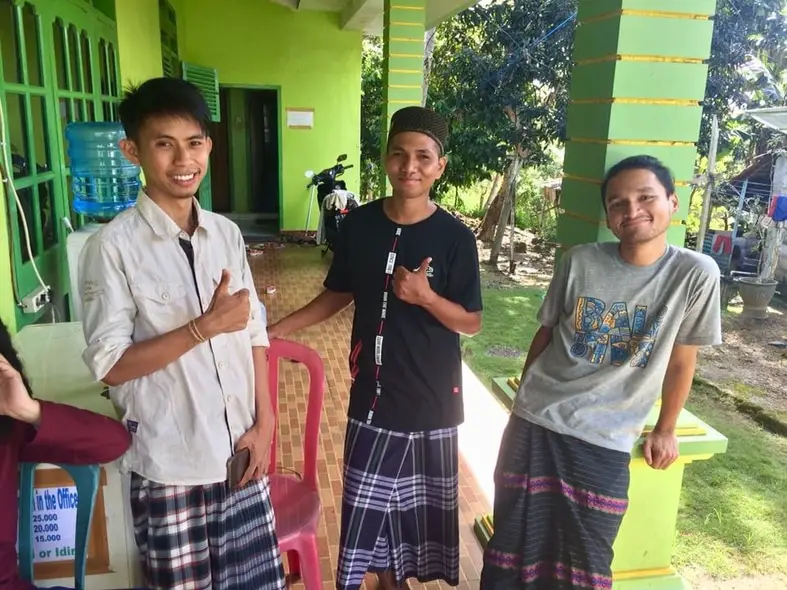
If you’re wondering what you should say to people on Eid in Indonesia, here are the phrases that we learned are appropriate to say on this special occasion:
Happy Eid Mubarak! = Selamat Lebaran!
Happy Eid-al Fitr! = Selamat Idul Fitri!
Happy Eid Mubarak everyone! = Selamat Hari Raya semuanya!
What is Ramadan and Eid?
Ramadan is a holy month for Muslims wherein people fast for a month (not eating or drinking from sunrise to sunset every day).
Eid is the holiday that marks the end of Ramadan and depending on the country and culture includes various celebrations including prayers, special meals, and fireworks.
Why are the dates for Ramadan and Eid different each year?
You may notice that in Indonesia, Malaysia and other Muslim-majority countries, the dates for Ramadan and Eid are “expected” and not confirmed.
This is because the Islamic calendar (or lunar calendar) follows the phases of the moon (as it waxes and wanes), with Ramadan beginning in the ninth month each year—and depending on the country you’re in, the protocols and procedures for the observation of the new moon will vary.
Some countries begin celebrating Ramadan according to precise scientific data of when the new moon will begin, while others prefer to start Ramadan based on the observation of the new moon by the naked eye. Still others observe a traditional custom of beginning Ramadan when a slight crescent of the new moon is visible.
In Indonesia, as diverse as it is, there seems to be much debate every year over the start date of Ramadan.
Another interesting aspect of the Islamic, or lunar, calendar is that it moves backward (in comparison to the Gregorian calendar, used in the U.S.) by 11 days every year, so Ramadan has been taking place in the summer for the past few years, but will be shifting into the spring and then winter months.
It depends where in Indonesia you go!
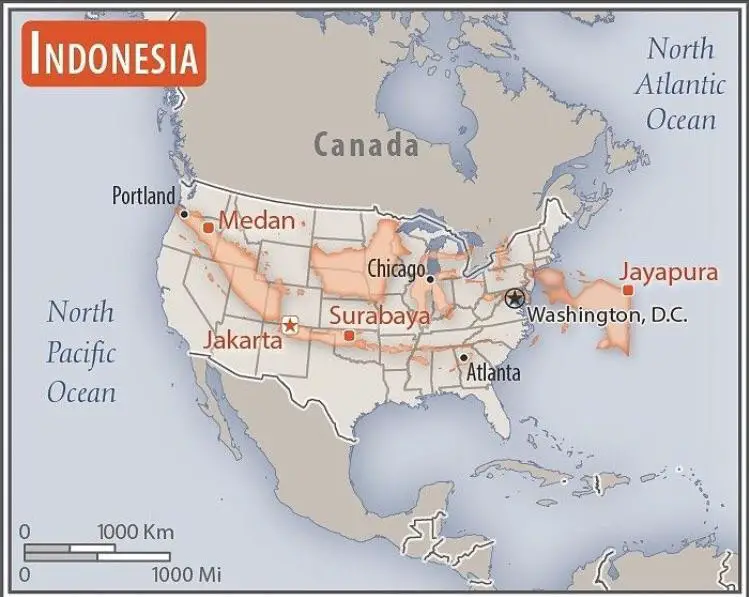
As you can see in the map directly above of Indonesia transposed over North America, Indonesia is an enormous country.
Indonesia encompasses a range of different religions, languages, and cultures. Although Indonesia is a Muslim-majority country, not all of Indonesia is Muslim. Keep in mind that depending on where in Indonesia you travel, you may be affected differently by the Ramadan and Eid holiday.
